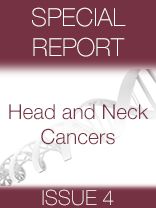Ilaria Muller on a Possible Common Antigen Between Thyroid and Breast Cancers
Muller says if this common antigen does exist, an immune therapy could hypothetically be developed to combat it and essentially combat both breast and thyroid cancer.
Ilaria Muller, PhD student, Cardiff University, on a possible common antigen between thyroid cancer and breast cancer. Muller says if this common antigen does exist, an immune therapy could hypothetically be developed to combat it and essentially combat both breast and thyroid cancer.
Muller sadds that in most forms of thyroid cancer, the thyroid can be removed and replacement treatments for its function can be taken. Muller and colleagues at Cardiff Univeristy are currently investigating the topic of thyroid autoimmunity as a biomarker of outcome in women with breast cancer by way of a large-scale study using data from the Taxotere As Adjuvant Chemotherapy (Tact) Trial (Cruk01/001).

Survivorship Care Promotes Evidence-Based Approaches for Quality of Life and Beyond
March 21st 2025Frank J. Penedo, PhD, explains the challenges of survivorship care for patients with cancer and how he implements programs to support patients’ emotional, physical, and practical needs.
Read More
Anticipating Novel Options for the RAI-Refractory DTC Armamentarium
May 15th 2023In season 4, episode 6 of Targeted Talks, Warren Swegal, MD, takes a multidisciplinary look at the RAI-refractory differentiated thyroid cancer treatment landscape, including the research behind 2 promising systemic therapy options.
Listen